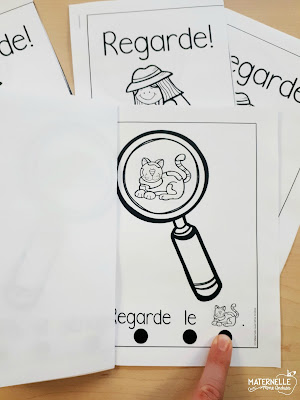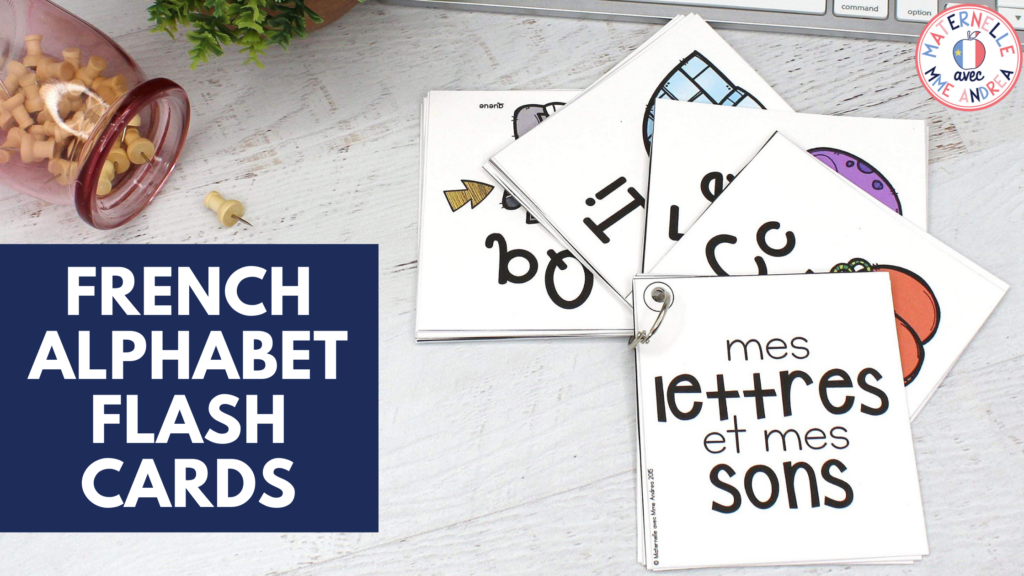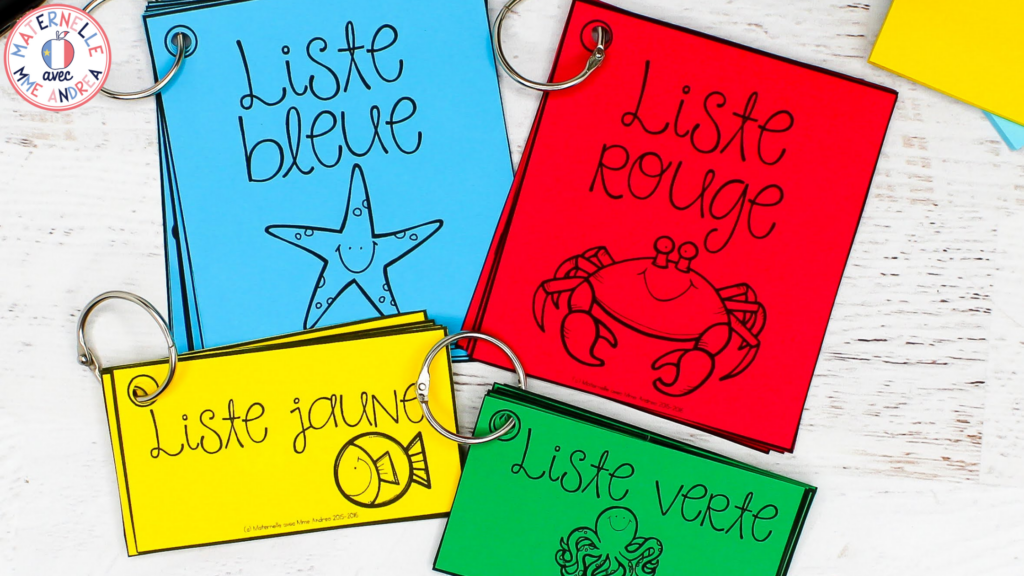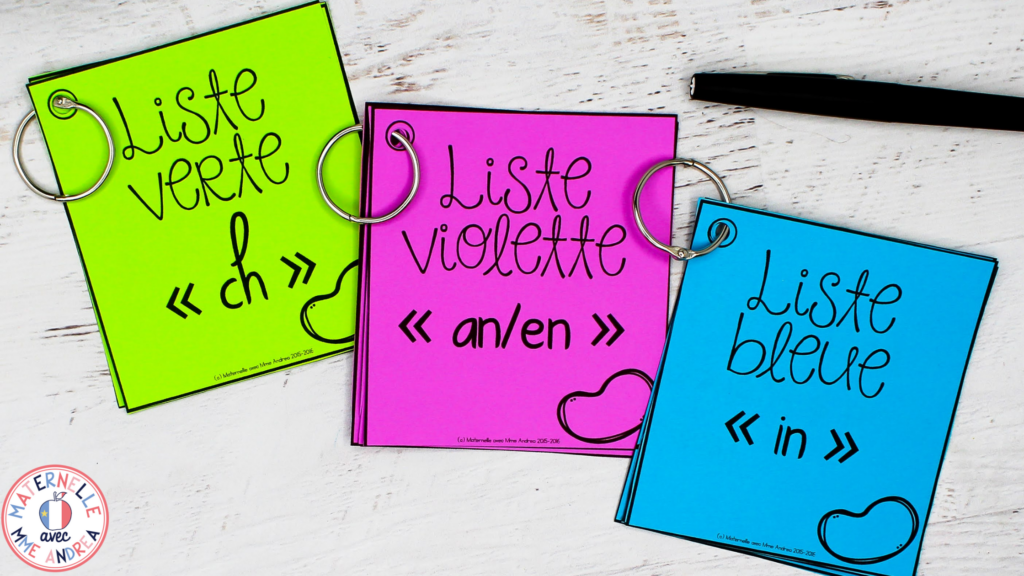Homework… to send it or not to send it in the primary grades? Do you send homework activities in kindergarten? What about in grade one?
Over the years, I have tried a variety of things, and thought a lot about homework activities in the primary grades. What I send home has changed so much since the beginning of my career, and I wanted to talk a bit about how homework looks for my students and me today.
Homework in the primary grades can be a BIG debate, and everyone has an opinion. Read on to learn mine!

But first, let’s rewind a bit and check out my homework journey and see how my beliefs have changed throughout the last ten years.
The first 3 years of my career, I did the whole “message du jour” daily homework. I stubbornly claimed that my students needed to practice one-to-one correspondance, high frequency words, and the whole homework “routine” in this way. And guess what? I was SO BORED of writing the messages du jour that I can’t even imagine how bored my students must have been reading them each night!
(*disclaimer – I am in no way trying to imply that message du jour is bad or unimportant – I am just saying that it wasn’t working for me and my class!*).
After those three years, I sat down and thought hard about what the whole point of homework is, and what my homework philosophy would be, moving forward. I asked myself what I could send home with my students each day that would really help them succeed with what we are working on at school.
Here are the thoughts about homework activities I came up with:
- It IS necessary, even in primary. Think about it – any other lesson/activity that children do as an extra-curricular requires practice. Want to learn how to play piano? You practice on the days you don’t have a lesson. Want to play in a hockey game? You have to go to practice. Want to get really really good and be drafted first overall into the NHL and win a Stanley Cup and Olympic gold before you turn 25? You practice as much as you can, in your basement with spare pucks and the dryer! So, if you want to become a fluent reader, you need to practice!
- It should NOT be used to teach new things. It should provide students with an opportunity to practice what they ALREADY KNOW, as a way to get really, really good at it. This was a big issue with my message du jour – half the words my students couldn’t even read for the first half of the year. Can you say frustrating?? For them and for their parents!
- It should be quick and efficient. Children need time to play and move their bodies. They spend lots of time working hard all day long at school. They are tired! I want my primary students doing no more than 15 mins MAX of homework a night.
- It should be consistent, but not boring. The routine should stay similar all year long, but the content can change as students learn more and more.
My bottom homework line?
Maybe I only feel this way because I have always been an athlete/performer, but I truly believe that if you want to get good at something, you need to practice on your own time!
Also, as much as it pains me to say it… I have 20 students. 20 students who at any point in the year can range from ages 4-6.
It is quite honestly IMPOSSIBLE to read with all of my students and practice their letters and sight words with them one-on-one every single day.
Sometimes, when it is particularly busy, I might only see certain students once a WEEK.
That is not enough practice time for any of the skills I want them to master!!!!
With these thoughts in mind, I next considered what all my students should know academically, no matter what, by the end of June. It’s my goal to get them all there!
When I’m teaching kindergarten, I want my students to learn:
- the letter names and sounds of all the letters of the alphabet
- a handful of the most common French “sons composés” (on, ou, oi, etc.)
- at least 50 high-frequency words
- how to count to 20 inside out, upside down, and backwards! :)
- that they can use a combination of letters, words, and pictures to share their ideas with others
- that when you read, a word said = a word read (a word that you can see on the page)
- being at a francophone school, I of course want them to be able to speak clearly, correctly, and fluently, but that is a big can of worms to get into and another post for another day :)
I have a lot of other outcomes to cover too, of course, but it is going to be my personal goal to ensure that every student is able to do the above by the end of June.
When I am teaching première année, my goals are similar, but I want them to know ALL sounds, be able to count to 100, know more high frequency words, etc. Similar, but deeper and more solid.
So, what do I send for homework activities in the primary grades?
At this point, I pretty much send home just ONE thing as homework… a reading bag!
Each student has one gallon-sized zip lock baggie for a reading bag, and a second one for their agenda/any notices that go home. Each bag is reinforced with coloured duct tape on the sides so that it lasts the year. You can see some examples from this past year in the photo below:
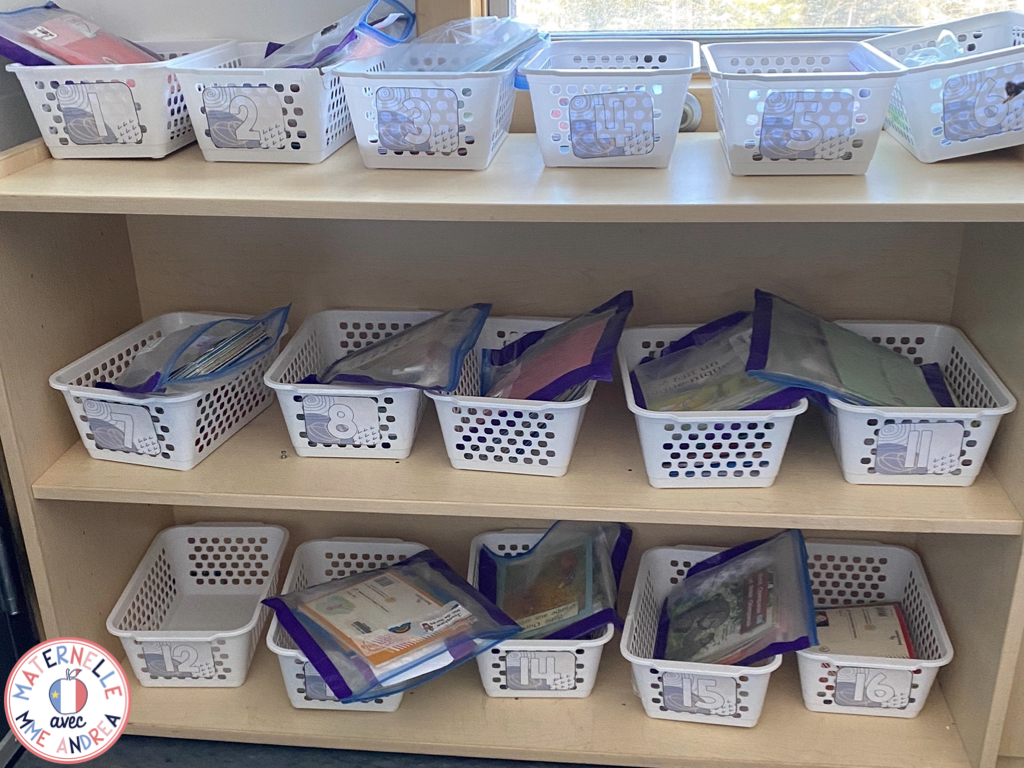
Students bring this reading bag to school each morning, and back home each night. During the school day, they stay in those baskets until we need them (for reading, small groups, etc.).
Inside each bag is a variety of items. I ask parents to just spend 10-15 minutes each night reading books, practicing flash cards, and/or doing the activities inside the bag.
That’s it!
What’s inside each reading bag?
What is inside each of the reading bags that students use for homework varies throughout the year, but some things do remain consistent.
First of all, all of my students’ reading bags contain four books at any given time. You can read more about these books and how we rotate them (and how often) in this blog post.
I only send books home that my students have already read with me – either whole group, small group, or one-on-one. Because, remember, homework should be review!
Next, each students’ reading bag also contains flash cards. These flash cards change depending on the time of year and the skills each student has already mastered. They are differentiated for each student, depending on their needs and the skills they need to practice.
I am a big believer in students being able to advance at their own pace!
How do I differentiate the flash cards I send for homework?
First of all, in the beginning of maternelle (and première année for those who need it), I give everyone alphabet flash cards. I give one card per letter, with the letter + an image of the same anchor word I teach in class. I also ONLY the letters I have explicitly taught. So, when I teach a new letter, I add it to their flash card ring. We do NOT start the year with 26 alphabet flash cards!
Homework should be review… remember?
This takes a bit of time, but I have my students add their own letter flash card each day.
(I teach a letter a day for the alphabet – you can read more about that in THIS blog post)
Some still need help, but most can do it on their own, so it doesn’t actually take that long. Adding the new flash card each day just becomes part of our routine!
Sight Words & Sounds Homework Activities
The next thing in my students’ homework bags are sight word flash cards OR son composé flash cards. I use this program for my sight words and sons composés. Students move through the rainbow at their own pace, learning and practicing 10 new sight words or one new sound at a time.
Quality is more important than quantity – it is more important to me that my students learn 10 words or one new sound at a time well, rather than give them all 90 words at once and hope they acquire some of them. It is also much quicker to practice only 10 words at a time.
As my students move through the lists, the sentence cards all contain words/sounds from the previous lists as well as the current list. This way, they are still reviewing the words they have learned. Yay for spiral review!
Once students move on to words/sounds I haven’t yet taught whole-group, I teach them in small groups or one-on-one before sending them home. Some of them are really quick learners!
Other homework activities (optional)
Finally, I also sometimes add fun games and activities to my students’ homework bags. These are things that we did together during our small group time that they really enjoyed and/or that practice a skill they really need to work on.
For example, my students love speed reading games, blending strips, nonsense word games, memory games, and more.
I do ask parents to send them back to me each day, as I said above. But, I still only send things that, if they don’t find their way back to me, it’s not the end of the world ;)
For some of my more reluctant readers who might not enjoy reading with their parents, these games can be a fun choice for them and opportunity to practice important reading skills in a low-pressure way.
To see the vast library of literacy games and books in my TPT store, just CLICK HERE !
Need more books to send home?
If you’re limited on the books you can send home with your students because your school doesn’t have many, I’ve got your back!
I have created tons of books and added them to my TPT store, and they target a variety of skills. For example, vocabulary, 1:1 correspondence, blending, sons composés, decoding, and more.
Here’s a few for you to peruse:
– Niveau A
– Sons composés Blending Books
– Lecture guidée en grand groupe
I’ve also got a couple free samples you can check out. Click the link of the book you want to try, enter your first name & email address, and I’ll send it your way!
Dion et le lion – Son composé Blending Book
Free Niveau AA Book for Vocabulary Building
No matter what you decide to do or how you feel about homework, I do invite you to take a second and reflect on your current practice and your actual beliefs/philosophy about it.
It can be all too easy to get caught in the trap of “I need to do it this way because it’s always been done this way”… but there is no harm in re-evaluating and adjusting if something isn’t working for you/for your students.
Good luck with whatever you decide… and feel free to let me know your thoughts in the comments below!


